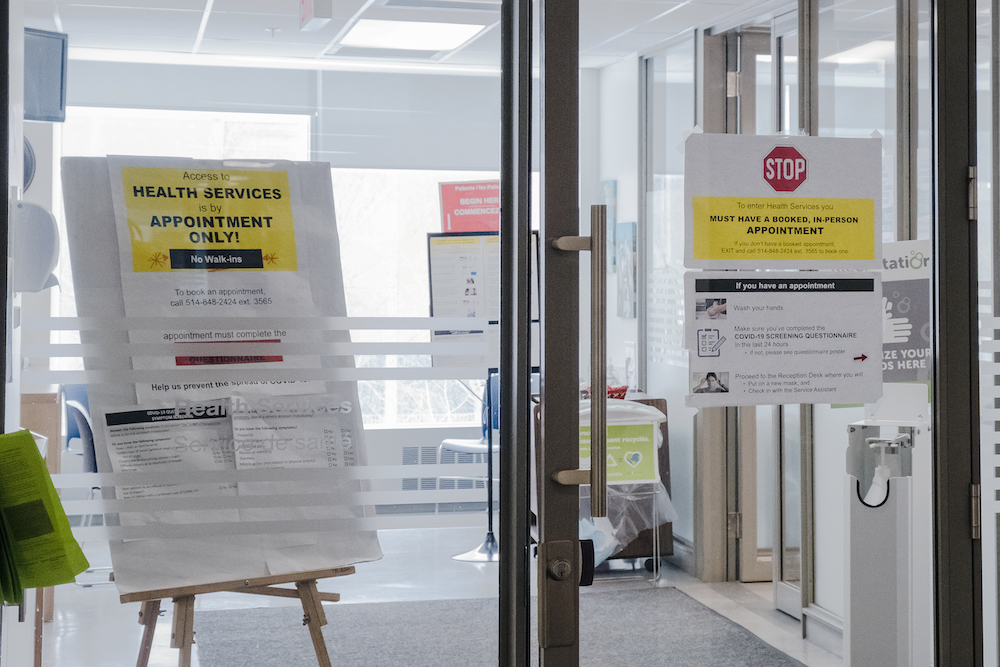Exploring the impact the return to campus is having
I heard the ping of my email, and saw it was from Concordia — instantly, my heart started racing.
I read the email and my heart sank. We were returning to campus as of Feb. 3, 2022.
This was two weeks ago. Concordia has since re-opened its door to students, with most campus activities returning in person.
My initial reaction to the news of in-person classes was anger and disbelief: was Concordia seriously doing this? We are still at the height of a pandemic, and their response was to make us all go back? I instantly started to spiral — at the time, this was the worst news I could have gotten.
Truth is, going back to campus right now is scary. For one, I am the mom of a 15-month-old. He cannot get vaccinated, he cannot wear a mask. He is vulnerable to COVID. Now, twice a week, I have to go to campus and potentially expose myself to COVID even more so than before.
On top of the added risk, Concordia doesn’t seem to be implementing too many measures to ensure that the return to school is safe. I would feel so much better if there were more measures put in place. This semester is now bound to be a mess. Don’t get me wrong — I want things to feel normal again. I just don’t know if that’s going to happen.
I am frustrated and scared about being in person. I feel rushed in my return to campus. What was the real reason? Is it really just because of government directives? The reasons are varied.
Many people I know are over COVID, and think that we just need to move on. They say that at this point, we have to accept COVID is not going away, so we need to “just live life” and let things go back to normal.
I tend to fall more into the other category, where I think most of us just need a little more time. We need to remember that we have not officially entered the endemic phase here, and I think it would be better to value health and safety before other things.
With all the conflicting opinions, we will never really know the real reason Concordia decided to go back in person so quickly.
There are aspects of in person learning that I miss and am looking forward to. I miss jumping into conversations and not having to wait in the Zoom queue — it would definitely make my seminars a lot more enjoyable.
I’m even looking forward to something as simple as holding a physical book in the library again. Those things will be great, but not at the expense of me, my family, and my classmate’s health.
All that being said, I am at a place where I have accepted that this is our shared hell-hole that we call reality. I don’t have much of a choice, other than signing the petitions calling for a slower transition that have been circulating. I have to comply, and make sure that I do what I can to be safe with my return to campus.
I also realized that I don’t have to go through this alone. There are resources that I can access at Concordia that can help make this transition easier.
Concordia offers short-term psychotherapy, which can help with the transition with going back to in person learning. Of course, the experiences that each student will get may not be the same. So it’s important to note that there may be some challenges accessing these services. Regardless, it is still a resource that Concordia offers, so at least getting some information about it can be a starting point to having support during a difficult time.
While you are waiting for the professional services, there are things you can do on your own that could help. Something as simple as creating playlists with happy music might help put you in a better mood. Or cooking that dish you have been thinking about cooking for oh-so-long. Even going for a nice walk to get some fresh air, might make things a little less scary.
One of the most interesting things is that Concordia offers some self-help tools, including a wellness tracking tool, and various workbooks that students and staff can consult. Sometimes we just need some self-reflection, and that may help.
There are also text/phone support options that students can access. While most of these are external links, they are still being suggested through Concordia, like Wellness Together Canada, which has many resources and options for people to use and perhaps help them.
Sure, they’re not perfect, and people need to explore what works best for them, but this is at least a foundation that could help students.
While I am still incredibly nervous about the potential exposure, and wishing Concordia would do more, I have hope that with time and with access to resources, the semester will be the best it can be despite all the issues we are still facing.
Photo by Kaitlynn Rodney




